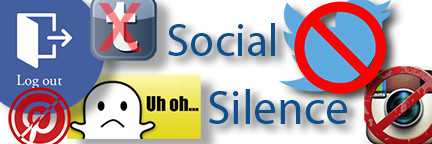Social Silence
Social media has us wrapped around its finger
More stories from Hailey Novak

Halloween isn’t the only time of year when zombies roam the streets of UW-Eau Claire.
Phantoms are no longer just ghosts that appear in Broadway performances either, they are fake vibrations we swear we feel from our cellphones; another sign that technology and social media have taken control of our lives.
Is that Frankenstein walking to class or an Eau Claire student zoned in on the latest twitter trend? The difference is slight.
Our eyes are bloodshot and rimmed with dark circles not because of Halloween makeup but because we spend all night staring into the damaging blue light of our smartphones, which, according to Harvard Health Publications, throws our circadian rhythm completely out of whack.
Maybe this is why you’re all barely half awake for your 8 a.m. classes (I don’t include myself in that statement because I believe class shouldn’t start any earlier than 11 a.m.).
Even if you disregard my previous opinions on why social media is detrimental, such as the envy it causes, FOMO (fear of missing out) and allowing us to falsely portray our lives, it’s hard to ignore that social media consumes nearly half of the average person’s day.
Data journalist Felix Richter discovered Americans spend 11-plus hours a day consuming electronic media.
Even as I looked around in my mass communication class yesterday during our discussion on media consumption, I saw a good portion of the lecture hall staring down at their phones under their desks.
We may like to boast that this is just multitasking and that we’re perfectly capable of taking notes and checking our Facebook notifications at the same time, but it’s actually giving us what Cleveland Clinic calls, “text neck”, the common neck pain young people are experiencing from hunching over their phones.
If this doesn’t already paint a zombie-esque image for you, we even speak our own language much like the inaudible groaning of our zombie doppelgangers, but instead our language is fueled by social media norms.
It’s no surprise to hear someone on campus uttering the phrase, “Hashtag blessed!” (#blessed), when something good happens to them.
Our grandparents are already confused as to what Twitter is in the first place and now we are incorporating its’ platform into our daily conversations.
Sure, the zombie comparison may be dramatic but it’s also ridiculous to pretend like social media hasn’t begun to mold us in this way.
It’s not all bad, we use social media to receive news updates, and obtain information quickly, and it’s become a concrete part of our lifestyle. It’s the overconsumption of social media though, that becomes hazardous, as it’s said to create addictive qualities.
Each notification alert fuels our obsession, we’re continually encouraged to keep posting and sharing when our dopamine levels soar as we receive positive feedback in the forms of likes and retweets.
A lot of these hazardous aspects go unnoticed because we’re so desensitized to how much social media shapes our daily lives.
In that same communication class mentioned, my professor asked our class how long they could go without mass media, while that doesn’t solely include social media, the idea is similar.
Many students speculated that they could go only go anywhere from a few hours to a couple days without it.
Even I am not the best example of going without mass media because I still have a presence on Facebook and have access to news sites to consume my daily dose of media-based technology.
The realization that we truly feel like we can’t live long without it though, is a haunting thought.










